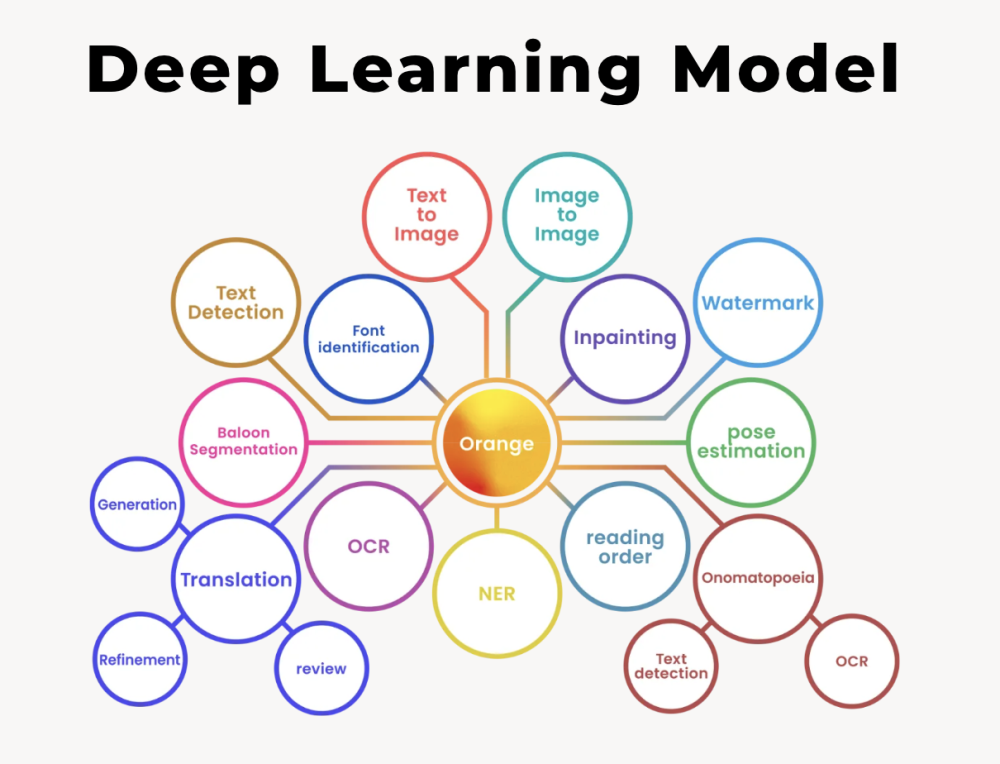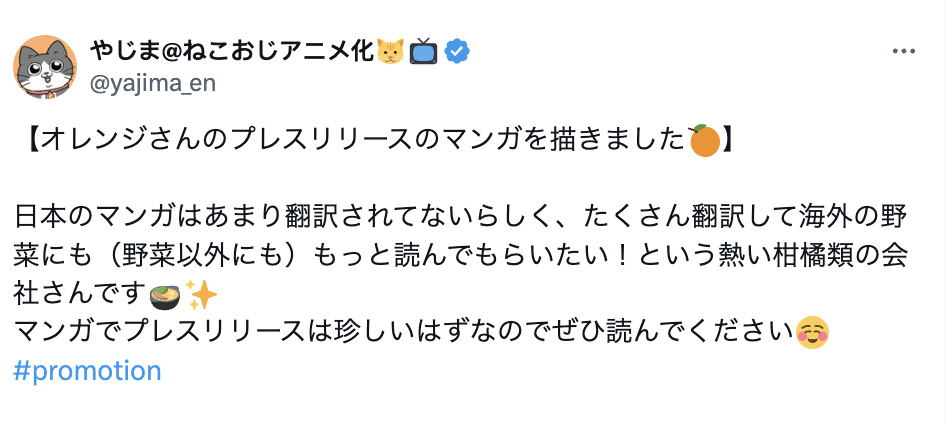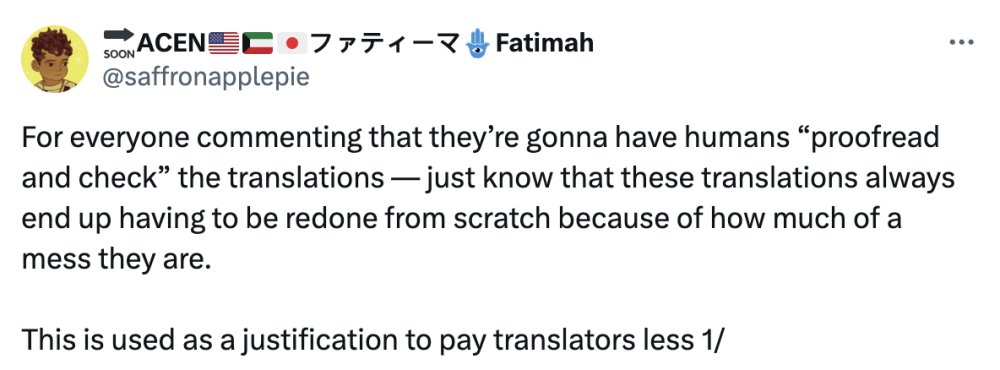
This round of funding for this US/Japan-based start-up include investments from Japanese publisher Shogakukan (publisher of Shonen Sunday manga magazine, and part owner of VIZ Media), and investment funds Globis Capital Partners, ANRI, SBI Investment, JIC Venture Growth Investments, Miyako Capital, Chiba Dojo Fund, Mizuho Capital, Mitsubishi UFJ Capital, and GFR Fund.
According to Orange’s press release, “The resources will go to increasing the pace of manga localization currently done in Japan roughly fivefold, to 500 titles per month,” and to ultimately, “deliver entertainment through the Japanese manga art form and its rich history to generations to come.”
So what will this cash infusion do for this start-up? According to their announcement, Orange will further develop Factory, their manga localization tool, and launch Emaqi, their website/ebook app for manga in English in Summer 2024.
These funds are also presumably being applied toward the establishment of their US offices, and hiring employees, freelancers, consultants, plus what looks to be an ambitious online marketing plan involving paid ads, manga trailers, onboarding social media influencers, and more.

The centerpiece of Orange’s service offerings is Factory, a “dedicated manga localization tool.” According to Orange, their “world-class machine learning engineers are leveraging deep learning models centered on computer vision and natural language processing to automate much of the time-consuming localization processes required to release foreign language versions.”
You can see a demo of how manga creators and publishers can use Factory in this YouTube demo video, featuring Mr. Orange (turn on closed captions to read the English subtitles)
The other part of Orange’s entry into the English language manga publishing scene is Emaqi, their e-bookstore that will “make it easier (for readers) find favorites while also offering recommendations.” Promising to “allow fans to enjoy manga on the go,” Emaqi is scheduled to launch in Summer 2024 in the US, and “will feature works translated using Orange’s technology, recommendations, curations by manga influencers, and manga trailers.” Emaqi promises to offer “unique titles of all genres,” with the lofty goal to “unite readers with titles that will impact their lives regardless of nationality, age, or gender.”
Orange’s earlier AI-assisted manga translation projects
This isn’t the first time that Orange has announced its intentions to use AI-assisted technologies for Japanese-to-English manga localization.
Earlier this year, the company’s technologies were used to translate for the English lettering on Rugby Rumble by Daisuke Miyata, a sports manga series on Shueisha’s Manga Plus website/app, but was swiftly met with criticism from readers as well as freelance translators and lettering professionals.
UPDATE: The English translation for Rugby Rumble on Manga Plus was not done with Orange’s AI translation tools, but it did make use of its lettering capabilities. Mei Amaki is the translator for Rugby Rumble, and a few other series on Manga Plus.
But even after the outcry from their first releases on Manga Plus, Orange’s AI-assisted manga translation technologies have been in use on a smaller scale: to offer simulpubbed chapters of Neko Oji ni Tensei Shita no Ojian (The Guy Who Got Reincarnated as a Cat), a quirky comic strip about a middle-aged office worker who gets reincarnated as a cute kitten.
Yajima, the Japanese manga creator of Neko Oji has been using Orange’s AI manga translation services to simulpub Japanese and English versions of their online comic via their X/Twitter feed at @neko_oji_en for several months now:
Neko Oji is a quirky, cat-centric twist on the “reincarnation” trope — in this case, the older man/kitten adopted by the president of the company where he once worked. The company president is a stern, no-nonsense executive at the office, but once he’s home, he’s a total softie who absolutely dotes on his new pet, Mr. Pun, never realizing that this curious kitten has an old man’s soul.
Neko Oji turned its online popularity into a book deal, and there are currently two volumes of the series published in Japanese by Kadokawa. However, as of press time, no English language manga publishers, print or digital, have picked up this series for distribution.
Neko Oji is not the only Japanese manga series that has been serialized to readers worldwide via Twitter/X and Instagram, but it is one of the few that is regularly posting official English and Japanese versions online.
Yajima is also the artist behind the manga featuring Mr. Orange, a large talking citrus(?) that explains what Orange Inc’s technology can do. Yajima proudly announced this collaboration with Orange Inc. on their Twitter/X feed, noting that it’s quite rare to see a press release done in manga format like this.

You can read the entire 12-page “Let’s Go Mr. Orange” manga in English too.
From the presentation deck sent to the media as part of this announcement, Orange describes their company mission: “to create a world where everyone enjoys manga.” The presentation compares Orange’s goal is to be to manga, what Spotify is to music, and Netflix is to movies: to make a lot of content available online to a lot of readers, worldwide, and make it affordable too.
The problem statement put forth by the company puts numbers to what many in the manga publishing world have known for a long time: that what gets published in English is just a tiny fraction of the manga published in Japanese.
According to their presentation, “As of 2023, only approximately 10,000 volumes of manga have been published in English, representing only 2% of the total volumes published in Japan.”
What keeps more manga from being published in English? According to Orange, one major barrier is the cost of localization, and the time and numerous steps, and people involved (both employees and freelancers) to produce English versions of Japanese manga. The cost quoted in Orange’s presentation? $7,000 per volume of manga.
In the “Let’s Go Mr. Orange” manga, we meet Mr. Orange, a passionate manga fan, finding out from Mr. Bean that it would take “10 billion yen and 10 years” to publish 10,000 manga series in English. Mr. Bean continues, “Translating manga is a massive undertaking that requires a ton of steps,” involving editors, logo designers, translators, translation agencies, proofreaders and “artists for phototypesetting” (a.k.a. lettering)”
Of course, online piracy is another issue identified by Orange as both a reason for its existence, and a major concern of both manga creators and publishers. Their press release / presentation deck mentions that the “damages caused by online piracy, “exceeds $10 billion USD, annually.”
Meanwhile, Orange predicts that the global manga market will continue to grow, with a total addressable market (TAM) of $15 billion USD. But they also added that at best, the percentage of digital manga sales in the US is ~20% of the total manga sales, which lags far behind Japan, where digital manga sales currently make up 66% of the market.
One reason why the percentage of digital manga sales in the US is way lower than Japan is because of another issue identified in Orange’s presentation: compared to Japan, there aren’t as many dedicated apps to provide “cross-publisher manga sales” in English.
They’re not wrong there. In Japan, there are several manga apps/ebook stores and services that publish manga by many publishers, including Line Manga (a division of Naver, owner of WEBTOON), Comic C’moA (owned by NTT Solmare, which runs the Manga Plaza English manga service), Piccoma (a division of Kakao Entertainment, parent company of webtoon app/site Tapas), Manga Bang, Papyless, which has a Japanese Renta ebook site and an English Renta site, and ebook stores like BookWalker, a division of Kadokawa that has both a global site (selling English manga and light novels) and their Japanese site, which has a much larger selection of titles from more publishers.
For the companies mentioned that have English versions of their manga/ebook sites, the selection of titles they offer in English are very different, and offer a limited selection compared to what’s offered on their Japanese counterpart sites/apps. On these Japanese eBook/manga sites/services, the latest ebook volumes and even some single chapters of manga from almost every publisher, big or small, as well as a deep catalog of backlist and mid-list titles that include classic, popular, obscure, and indie manga series of all kinds can be found and purchased instantly. What about the English versions of these company’s ebook sites? Uhmm. Not so much.
In N. America, there’s no single ebook site/platform/app that will allow you to purchase and read the latest manga chapters or graphic novel releases in English from any publisher. For example, I buy a LOT of manga and webtoons, as ebooks and single chapters, in print and digital format. My digital library of manga and webtoons are contained in at least 10 different digital apps/subscription services, which may or may not disappear if any of these companies go under (pours out a 40 oz. for J-Manga).

Given the current state of affairs, it is highly unlikely that Orange’s Emaqi ebook service for manga will magically convince all English manga publishers, big and small, to start offering their titles on their app, when so many other manga websites, ebook platforms and apps (even Amazon Kindle!) have failed to do this before.
We’ll just have to wait and see what Emaqi will have to offer to manga readers, when it’s launched later this summer.
Reactions from readers, translators and lettering pros
After Orange’s announcement, manga translators, readers, and lettering professionals weighed in, with many disputing Orange’s claims of saving time and money for publishers, given that this would come at the expense of readability and would likely result in double work for less pay for translators, localization editors, lettering professionals.
Here’s a sampling:
Fatimah Haji-Asiri (@saffronapplepie), JP-to-EN Translator/Localizer:
“For everyone commenting that they’re gonna have humans “proofread and check” the translations — just know that these translations always end up having to be redone from scratch because of how much of a mess they are. This is used as a justification to pay translators less because they’re “just checking” and the translation “is basically done” when it’s actually wayyy more work for less pay. It takes more time and effort to fix it than to just have a translator do it from scratch. I’ve been there, and most translators know what it’s like. Both the consumer and those in the industry deserve better. May they crash and burn and they will eventually. And frankly, this generally comes out to be more costly and less efficient. It’s not sustainable. This kind of thing is cannibalizing the industry. You could just pay people and it would be cheaper and more quality in the long run.”
“Market rate is $5~$6/page for translation, let’s say $6/page for basic lettering $19.5 million in USD could pay for the translation and lettering of 1,625,000 pages That’s about 10,000 books they could have paid a fair rate for”
Sara Linsley (@salinsley) – software engineer, font designer, and comic book letterera
So what do you think of Orange’s announcement, their AI-assisted manga translation service, and the upcoming release of their ebook service? Add your comments below.
No comments:
Post a Comment